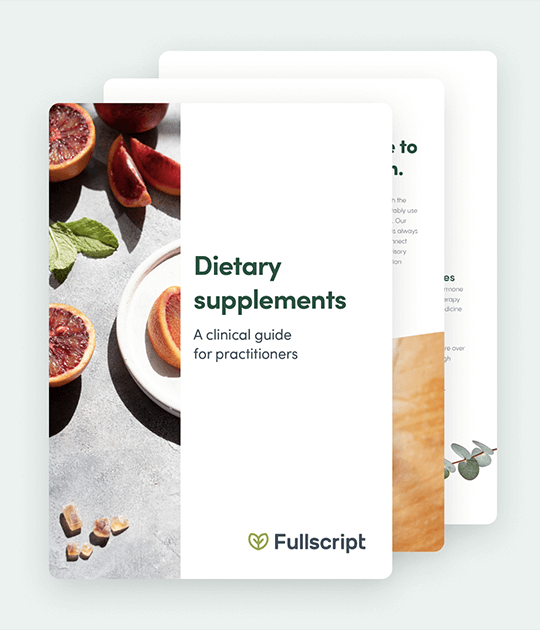It may be surprising that many men aren’t getting enough of the nutrients they need. But fact is the high-calorie, low-nutrient foods found in the Standard American Diet that many individuals rely on leave men struggling with low levels, and sometimes even deficiencies, of the nutritional building blocks they need.
Keep reading to learn more about the top four key nutrients that many men aren’t getting enough of, why they’re important, and where to find them.
Vitamin D and men’s health
Vitamin D is one of the most talked about vitamins—and with good reason. First, because it’s essential to health. And second, because vitamin D deficiency is staggeringly common. According to one study, more than 40% of American adults are deficient in vitamin D. (8) The number of people who have less-than-ideal levels of the vitamin are even higher.
Improve patient outcomes with Fullscript’s free supplement planning platform
Known as the “sunshine vitamin,” vitamin D is produced in the body when we’re exposed to ultraviolet rays from the sun. If you don’t get much sun exposure without sun protection, or if you have dark skin, you might need to increase your vitamin D intake. In addition, older adults, people with inflammatory bowel disease, people with obesity, and people who have had gastric bypass surgery have a higher risk of vitamin D deficiency. (19)

Why vitamin D is important for men
Vitamin D helps the body absorb calcium, which is essential for healthy bones. In addition, vitamin D plays a vital role in muscle and nerve health and makes it possible for the immune system to protect us. (19) Inadequate vitamin D levels can lead to an increased risk of bone fracture (10) and several types of cancer. (9)
Vitamin D is also linked to testosterone levels. One study found that men with low vitamin D levels had significantly lower testosterone levels than men with normal vitamin D status. (11) However, a second study found that year-long vitamin D supplementation can increase testosterone levels. (23) It’s not entirely clear why vitamin D and testosterone levels are linked, but it’s clear that keeping your levels up is a good idea all around.
How much vitamin D men need
Aim for 600 IU per day if you’re between the ages of 19 and 70. If you’re 71 or older, that number goes up to 800 IU per day. (20)
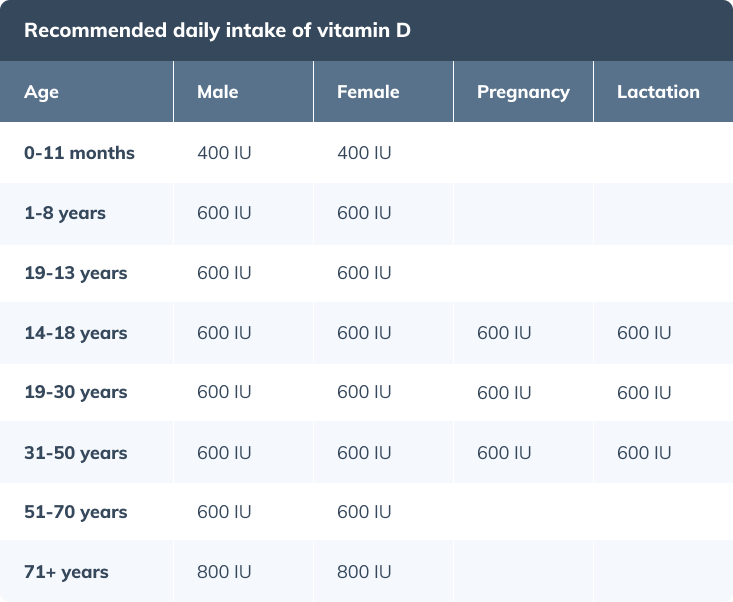
How men can increase their vitamin D
You can increase your vitamin D levels by spending more time outdoors in the sun. Some foods also contain vitamin D, including fatty fish, beef liver, cheese, egg yolks, and fortified foods like cereal, milk, and orange juice. Vitamin D supplements are also an option if your healthcare provider determines that your levels are low. (19)
Calcium and men’s health
Calcium is so scarce in the Standard American Diet that it earned a place on the “nutrients of public health concern” in the 2015-2020 Dietary Guidelines for Americans. (1) You’re at higher risk of deficiency if you have lactose intolerance, don’t eat dairy, or are over the age of 70. Also, vitamin D is essential for calcium absorption, so if you’re not getting enough of that key vitamin, your calcium levels may suffer as well. (16)

Why calcium is important for men
Calcium is essential for healthy bone development, meaning it’s especially important to get enough while bones are developing—up to age 30. But even after that, low calcium intake can lead to bone breakdown. That’s because when you’re not taking in the calcium needed for things like heart function, muscle function, and hormone secretion, your body will pull the calcium it needs from your bones. (16)
There’s also some evidence that diets with enough calcium may help lower blood pressure. (2) Given that men are more likely than women to have high blood pressure—and that high blood pressure is a major risk factor for heart disease—it’s important that men do what they can to keep their blood pressure in check. (7)
How much calcium men need
If you’re between the ages of 19 and 70, you need 1,000 mg per day. If you’re 71 or older, aim for 1,200 mg per day. (16)
How men can increase their calcium
The obvious source is dairy products, but that’s not the only way to get calcium. Kale and broccoli are good natural sources, and cereals are often fortified with calcium. Supplements are available as well, but be careful not to overdo it. There’s some research that suggests getting too much calcium from supplements increases the risk of heart disease. (14)
Omega-3s and men’s health
Omega-3s are fatty acids that we get through dietary sources like fish and nuts. When we talk about the health benefits of omega-3s, we’re generally talking about the three main ones: DHA (docosahexaenoic acid), EPA (eicosapentaenoic acid), and ALA (alpha-linolenic acid).
In a perfect world, we’d get plenty of these essential fatty acids from our diet. But as we know, the Standard American Diet is anything but perfect.
We face two challenges when it comes to omega-3s. One is that the vast majority of us simply don’t get enough. The other problem is that omega-3s need to be in balance with other fatty acids, omega-6s.
The problem is that since we started relying on industrial foods, our omega-3/omega-6 ratio has gone seriously awry. Scientists believe that human bodies evolved to need a 1:1 ratio of omega-3s to omega-6s. But because we rely now on so many processed foods—which are abundant in omega-6s—our ratio is now closer to 1:20. That means we’re getting 20 times as much omega-6 as omega-3. (24)
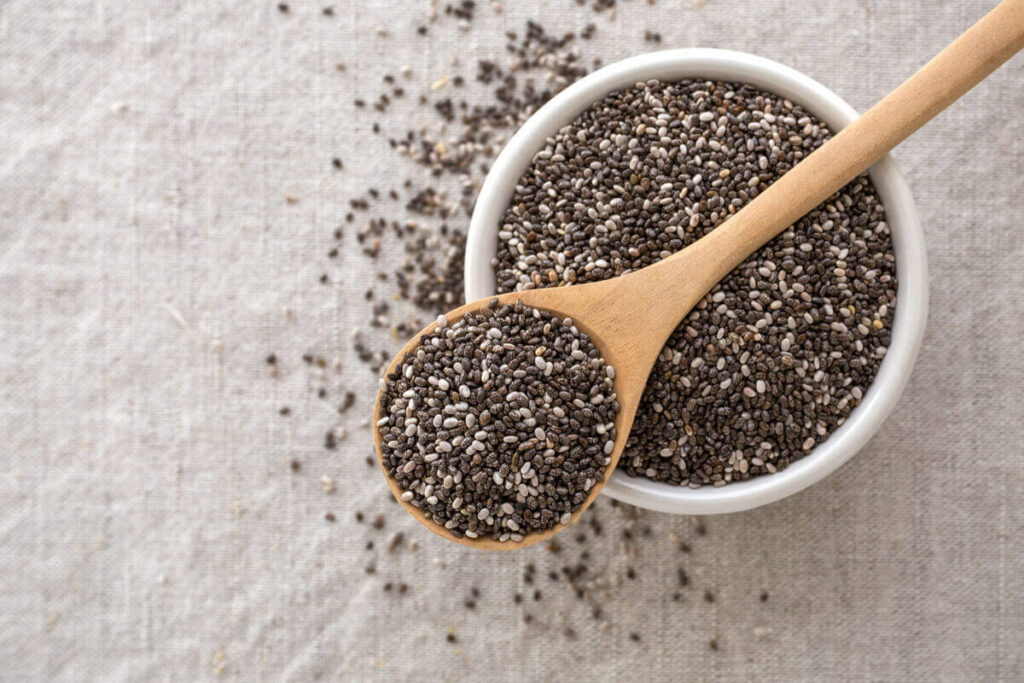
Why omega-3s are important for men
Omega-3s are essential fats, meaning you need to get them from your diet—your body can’t make them. They are key to countless aspects of health, but here are some of the most significant benefits that men need to consider:
- Brain health: Omega-3s are the building blocks of nerve cells, so they’re crucial for brain health. Research has found links between omega-3s and a variety of brain and mental health issues such as Alzheimer’s disease, depression, Parkinson’s, and more. (6)
- Heart health: Heart disease is the leading health concern for men. Omega-3s have been shown to reduce heart disease risk nearly across the board—lowering your chances of heart failure and both fatal and non-fatal coronary heart disease. (4)
- Exercise recovery: Omega-3s help curb the muscle soreness that comes with weight lifting. This is good news not just for those who go to the gym a lot, but also for people undergoing physical therapy. (12)
How much omega-3 men need
The official adequate intake for men is 1.6 grams of omega-3s per day. (18) Some of the studies that were looking for therapeutic effects used higher doses.
How men can increase their omega-3s
Seafood—specifically fatty fish like salmon, mackerel, anchovies, and herring—is the best source of DHA and EPA. ALA can be found in plant-based sources like flaxseed, chia seeds, and walnuts. Supplements are another good option, and high-quality ones don’t contain mercury, which can be a concern when eating fish. (18)
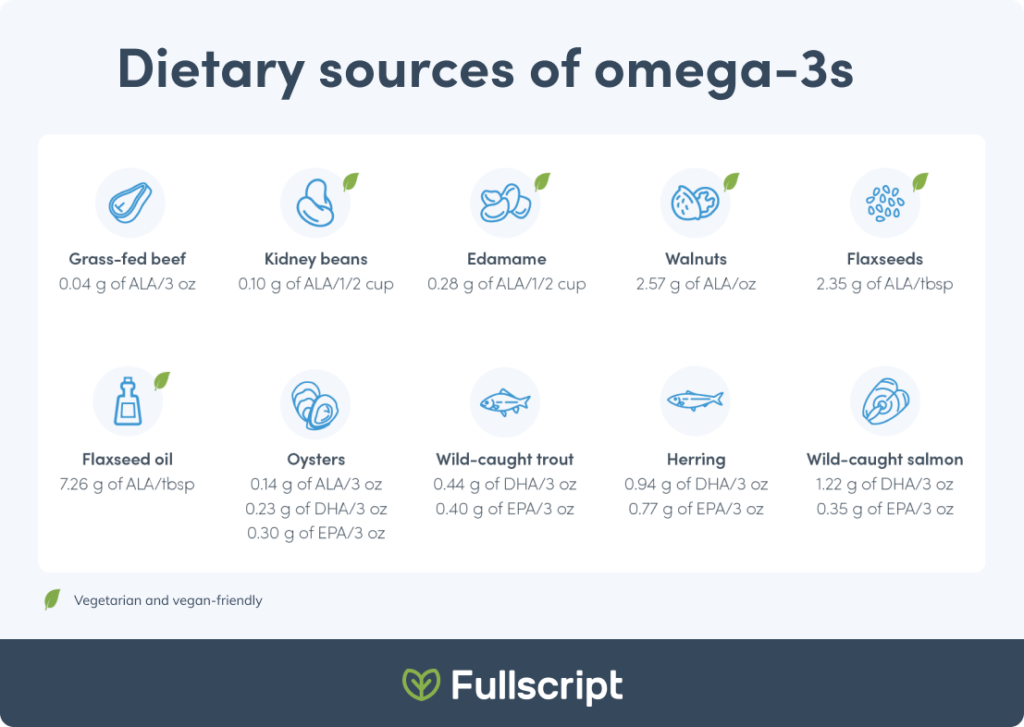
Magnesium and men’s health
Most men do not get the recommended daily intake of magnesium—but men in their 70s and beyond are especially susceptible to magnesium deficiency. People with digestive disorders like Crohn’s disease or celiac disease, those with type 2 diabetes, and those who consume too much alcohol are also at risk of not getting or absorbing enough magnesium. (17)

Why magnesium is important for men
Not getting enough magnesium won’t necessarily produce any immediate signs or symptoms. But over time, low magnesium intake can lead to a number of health concerns.
- High blood pressure and heart disease: Research shows that eating a diet rich in magnesium or taking magnesium supplements can lower blood pressure. (3)(13) Plus, research has found that people with the highest levels of magnesium in their blood are 38% less likely to suffer sudden heart-related death. (21)
- Type 2 diabetes: Magnesium is an important player in blood sugar metabolism, which might be why people with higher magnesium intake have a significantly lower risk of developing type 2 diabetes. (15)
- Osteoporosis: When we think about bone health, we usually think about calcium. But magnesium is also essential for bone formation. Magnesium deficiency has been linked to osteoporosis and low bone density. (25)
- Migraines: If you have migraines, low magnesium might be playing a role. People who supplement with magnesium daily report reduced frequency, duration, and severity of migraines. (22)
How much magnesium men need
Between the ages of 19 and 30, aim for 400 mg per day. If you’re 31 or over, that number goes up to 420 per day. (17)
How men can increase their magnesium
The good news is that magnesium is easy to find in a healthy diet. It’s abundant in green leafy vegetables, legumes, nuts, seeds, and whole grains. Supplements are also available.
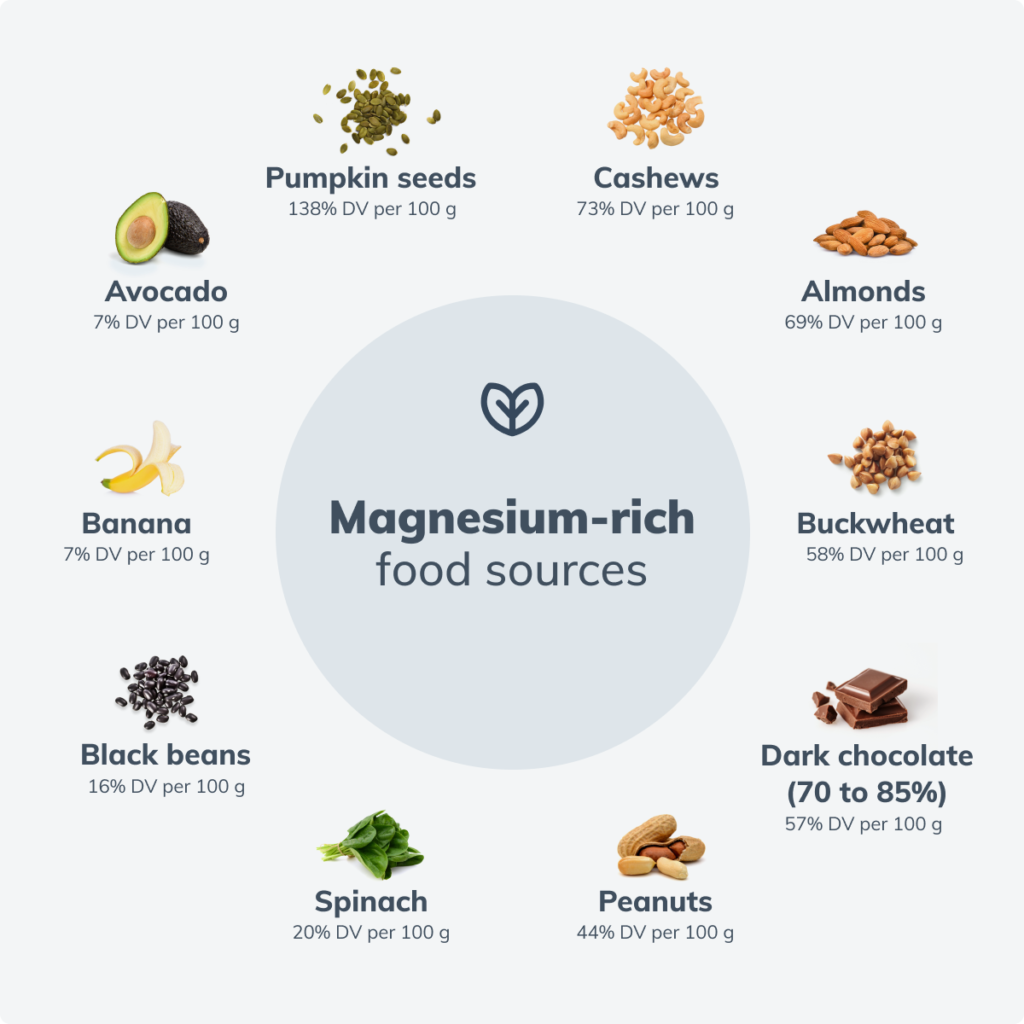
The bottom line
If you’re a man looking to improve your health—and maintain it for years to come—you should pay attention to your intake of these key nutrients. The good news is that you can get plenty of them by eating a healthy, whole-foods diet like the Mediterranean diet.
A focus on fish, leafy vegetables, whole grains, and some dairy—as well as a bit of daily sunshine—will check most of the boxes and help you prevent some of the most common nutrient deficiencies in men. If you’re a patient, speak to your integrative healthcare provider before taking new supplements or making significant changes to your diet.
Quality supplement plans in less than a minute
- 2015-2020 Dietary Guidelines | health.gov. (n.d.). https://health.gov/our-work/nutrition-physical-activity/dietary-guidelines/previous-dietary-guidelines/2015
- Appel, L. J., Moore, T. J., Obarzanek, E., Vollmer, W. M., Svetkey, L. P., Sacks, F. M., Bray, G. A., Vogt, T. M., Cutler, J. A., Windhauser, M. M., Lin, P. H., Karanja, N., Simons-Morton, D., McCullough, M., Swain, J., Steele, P., Evans, M. A., Miller, E. R., & Harsha, D. W. (1997). A clinical trial of the effects of dietary patterns on blood pressure. New England Journal of Medicine, 336(16), 1117–1124.
- Champagne, C. M. (2006). Dietary interventions on blood pressure: The dietary approaches to stop hypertension (DASH) Trials. Nutrition Reviews, 64, S53–S56.
- Del Gobbo, L. C., Imamura, F., Aslibekyan, S., Marklund, M., Virtanen, J. K., Wennberg, M., Yakoob, M. Y., Chiuve, S. E., dela Cruz, L., Frazier-Wood, A. C., Fretts, A. M., Guallar, E., Matsumoto, C., Prem, K., Tanaka, T., Wu, J. H. Y., Zhou, X., Helmer, C., Ingelsson, E., . . . Mozaffarian, D. (2016). ω-3 Polyunsaturated fatty acid biomarkers and coronary heart disease. JAMA Internal Medicine, 176(8), 1155.
- Djoussé, L., Akinkuolie, A. O., Wu, J. H., Ding, E. L., & Gaziano, J. M. (2012). Fish consumption, omega-3 fatty acids and risk of heart failure: A meta-analysis. Clinical Nutrition, 31(6), 846–853.
- Dyall, S. C. (2015). Long-chain omega-3 fatty acids and the brain: a review of the independent and shared effects of EPA, DPA and DHA. Frontiers in Aging Neuroscience, 7.
- Everett, B., & Zajacova, A. (2015). Gender differences in hypertension and hypertension awareness among young adults. Biodemography and Social Biology, 61(1), 1–17.
- Forrest, K. Y., & Stuhldreher, W. L. (2011). Prevalence and correlates of vitamin D deficiency in US adults. Nutrition Research, 31(1), 48–54.
- Gupta, D., Vashi, P. G., Trukova, K., LIS, C. G., & Lammersfeld, C. A. (2011). Prevalence of serum vitamin D deficiency and insufficiency in cancer: Review of the epidemiological literature. Experimental and Therapeutic Medicine, 2(2), 181–193.
- Holick, M. F. (2006). The role of vitamin D for bone health and fracture prevention. Current Osteoporosis Reports, 4(3), 96–102.
- Holt, R., Juel Mortensen, L., Harpelunde Poulsen, K., Nielsen, J. E., Frederiksen, H., Jørgensen, N., Jørgensen, A., Juul, A., & Blomberg Jensen, M. (2020). Vitamin D and sex steroid production in men with normal or impaired Leydig cell function. The Journal of Steroid Biochemistry and Molecular Biology, 199, 105589.
- Jouris, K. B., McDaniel, J. L., & Weiss, E. P. (2011). The effect of omega-3 fatty acid supplementation on the inflammatory response to eccentric strength exercise. Journal of sports science & medicine, 10(3), 432–438.
- Kass, L., Weekes, J., & Carpenter, L. (2012). Effect of magnesium supplementation on blood pressure: a meta-analysis. European Journal of Clinical Nutrition, 66(4), 411–418. https://doi.org/10.1038/ejcn.2012.4
- Larsson, S. C. (2013). Are calcium supplements harmful to cardiovascular disease? JAMA Internal Medicine, 173(8), 647.
- Larsson, S. C., & Wolk, A. (2007). Magnesium intake and risk of type 2 diabetes: a meta-analysis. Journal of Internal Medicine, 262(2), 208–214.
- Office of Dietary Supplements – Calcium. (n.d.). https://ods.od.nih.gov/factsheets/Calcium-HealthProfessional/
- Office of Dietary Supplements – Magnesium. (n.d.). https://ods.od.nih.gov/factsheets/Magnesium-HealthProfessional/
- Office of Dietary Supplements – Omega-3 Fatty Acids. (n.d.). https://ods.od.nih.gov/factsheets/Omega3FattyAcids-HealthProfessional/
- Office of Dietary Supplements – Vitamin D. (n.d.-a). https://ods.od.nih.gov/factsheets/VitaminD-HealthProfessional/
- Office of Dietary Supplements – Vitamin D. (n.d.-b). https://ods.od.nih.gov/factsheets/VitaminD-Consumer/
- Peacock, J. M., Ohira, T., Post, W., Sotoodehnia, N., Rosamond, W., & Folsom, A. R. (2010). Serum magnesium and risk of sudden cardiac death in the Atherosclerosis Risk in Communities (ARIC) Study. American Heart Journal, 160(3), 464–470.
- Peikert, A., Wilimzig, C., & Köhne-Volland, R. (1996). Prophylaxis of migraine with oral magnesium: Results from a prospective, multi-center, placebo-controlled and double-blind randomized study. Cephalalgia, 16(4), 257–263.
- Pilz, S., Frisch, S., Koertke, H., Kuhn, J., Dreier, J., Obermayer-Pietsch, B., Wehr, E., & Zittermann, A. (2010). Effect of vitamin D supplementation on testosterone levels in men. Hormone and Metabolic Research, 43(03), 223–225.
- Simopoulos, A. P. (2011). Evolutionary Aspects of Diet: The omega-6/omega-3 ratio and the brain. Molecular Neurobiology, 44(2), 203–215.
- Tucker, K. L. (2009). Osteoporosis prevention and nutrition. Current Osteoporosis Reports, 7(4), 111–117.






